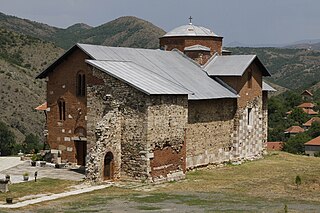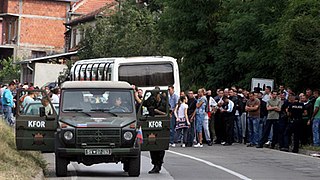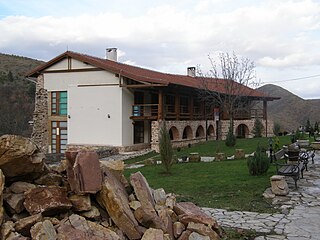Contents
| |||||
| Decades: | |||||
|---|---|---|---|---|---|
| See also: | |||||
Events in the year 2023 in Kosovo .
| |||||
| Decades: | |||||
|---|---|---|---|---|---|
| See also: | |||||
Events in the year 2023 in Kosovo .
Ongoing — COVID-19 pandemic in Kosovo

The Kosovo Force (KFOR) is a NATO-led international peacekeeping force in Kosovo. Its operations are gradually reducing until Kosovo's Security Force, established in 2009, becomes self-sufficient.

The Banjska Monastery is a Serbian Orthodox monastery in the Banjska village near Zvečan, Kosovo.

Lëvizja Vetëvendosje (LVV) is a centre-left to left-wing political party in Kosovo. It is orientated towards principles of social democracy, populism, and Albanian nationalism.

Albin Kurti is a Kosovo-Albanian politician and activist. He has served as the prime minister of Kosovo since 22 March 2021, having previously served in that role between February and June 2020.

The European Union Rule of Law Mission in Kosovo, known as EULEX Kosovo or simply as EULEX, is the largest civilian mission ever launched under the Common Security and Defence Policy (CSDP) of the European Union. EULEX supports selected Kosovo rule of law institutions on their path towards increased effectiveness, sustainability, multi-ethnicity and accountability, free from political interference and in full compliance with international human rights standards and best European practices.

The 2008 unrest in Kosovo followed Kosovo's declaration of independence on February 17, 2008. Some Kosovo Serbs opposed to secession boycotted the move by refusing to follow orders from the central government in Pristina and attempted to seize infrastructure and border posts in Serb-populated regions. There were also sporadic instances of violence against international institutions and governmental institutions, predominantly in North Kosovo.

Banjska is a village located in Zvečan in northern Kosovo. It has a population of 465 inhabitants as of 2011.

Clashes between the Republic of Kosovo and ethnic Serbs in northern Kosovo began on 25 July 2011 when the Kosovo Police crossed into the Serb-controlled municipalities of North Kosovo, to control several administrative border crossings. This was done without the Kosovo Police consulting either Serbia or Kosovo Force (KFOR)/EULEX. Though tensions between the two sides eased somewhat after the intervention of NATO's KFOR forces, they remained high amid concern from the European Union, which also blamed Kosovo for the unilateral provocation. On 19 April 2013, an agreement was signed in Brussels between representatives of Kosovo and Serbia. The 15-point document granted devolved powers to North Kosovo regarding economic development, education, healthcare and urban planning, and several mechanisms that allowed a certain autonomy in justice, policing and electoral matters.

The 2015 Kumanovo clashes, also known as Operation "Divo naselje" were a series shootouts which erupted during a raid between the Macedonian police and an armed group identifying itself as the National Liberation Army (NLA). They began on 9 May 2015 in the northern Macedonian town of Kumanovo. During the shootings, eight Macedonian policemen and 10 of the militants were killed, while 37 officers were wounded and hospitalized. The shooting ended on 10 May 2015, in an operation by the Macedonian police and armed forces, in which 30 men were arrested and charged with terrorism-related charges by the Macedonian authorities.

The 2000 unrest in Kosovo was the result of the United Nations Interim Administration adopting Resolution 1244 on 10 June 1999. The unrest was fought between the Kosovo Force (KFOR), Kosovo Albanians, and Kosovo Serbs. It lasted somewhere from 16 February - 6 June 2000.
The PANA coalition was a ruling post-electoral Kosovan political alliance between four major Albanian and six ethnic minority parties in Kosovo. Its formation ended three months of political uncertainty following the 2017 parliamentary election. It was founded originally as PAN coalition.
Events in the year 2021 in Kosovo.
Triggered by the Government of Kosovo's decision to reciprocally ban Serbian license plates, a series of protests by Serbs in North Kosovo—consisting mostly of blocking traffic near border crossings— began on 20 September 2021. The ban meant that individuals who owned vehicles with Serbian license plates in Kosovo would have had to switch for Kosovar license plates at a government vehicle registration center. The ban was intended to mirror a prohibition against Kosovar license plates that had been imposed by Serbia since 2008. The Government of Serbia does not recognise Kosovo's independence and considers the Kosovo–Serbia border to be temporary.
Beginning on 31 July 2022, tensions between Kosovo and Serbia heightened due to the expiration of the eleven-year validity period of documents for cars on 1 August 2022, between the government of Kosovo and the Serbs in North Kosovo. Kosovo, which declared independence in 2008, signed an agreement with Serbia in 2011 that determined the use of license plates in North Kosovo. This agreement was supposed to change license plates from the ones that were issued by Serbia to neutral ones. The agreement for the change was extended in 2016 and expired in 2021, which led to a crisis in 2021 that ended with an agreement to terminate the ban of Kosovo-issued license plates in Serbia.
Events in the year 2022 in Kosovo.
Events in the year 2022 in Serbia.
Local elections were held in four municipalities in the north of Kosovo on 23 April 2023. They were initially scheduled to be held in December 2022, but were subsequently postponed. The elections were held in the four Serb-majority municipalities of Leposavić, North Mitrovica, Zubin Potok and Zvečan, located in North Kosovo. The elections were boycotted by the biggest Serb political party in Kosovo, the Serb List, following its departure from Kosovan institutions and the resignation of their mayors in North Kosovo in November. Among the declared candidates, there were only two Serbs. Aleksandar Arsenijević, candidate for mayor of the North Mitrovica Municipality, withdrew his candidacy on 2 December. Only the Democratic Party of Kosovo (PDK) and Vetëvendosje (LVV) had mayoral candidates in all four municipalities. Kosovo President Vjosa Osmani had initially set 25 December as the polling date for the municipal assemblies of Zvečan and Leposavić in the north of Kosovo. On 20 April, candidate for mayor of the Leposavić Municipality Aleksandar Jablanović, leader of the Party of Kosovo Serbs (PKS), withdrew his candidature for running in the elections.
Events in the year 2023 in Serbia.
The Agreement on the path to normalization between Kosovo and Serbia, informally known as the Ohrid Agreement, is an agreement mediated by the European Union that aims to normalize diplomatic relations between the Republic of Kosovo and the Republic of Serbia. On 27 February 2023, it was verbally accepted by Kosovar prime minister Albin Kurti and Serbian president Aleksandar Vučić and a plan for its implementation was agreed on 18 March 2023.

The Banjska attack was an armed attack conducted by armed Serb militants on a patrol unit of the Kosovo Police in the village of Banjska in northern Kosovo on 24 September 2023, resulting in the death of one police sergeant and the injury of another. The perpetrators then broke into the Banjska Monastery and barricaded themselves. In the following hours, the Kosovo Special Forces surrounded the area and after a firefight, at least 4 of the armed assailants were killed and two were captured by the police.